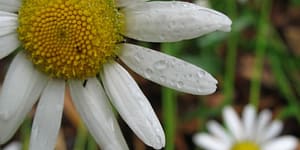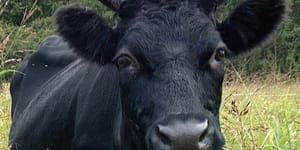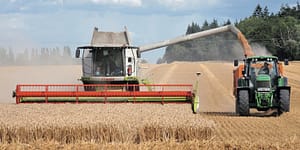Ireland: A Journey into the Heart and Soul

The following is an interview with Ruairí McKiernan, author of Hitching for Hope, and originally appeared in the Chelsea Green 2020 Spring Journal. It has been adapted for the web.
What does the future have in store if politicians aren’t beholden to the people, if the pace of development is compromising mental health, and if so-called progress is triggering ecological collapse? Ruairí McKiernan set out to answer these questions, but in order to do so honestly and authentically, he stepped out of his life as an award-winning social innovator, pioneering youth charity founder, and appointee to Ireland’s Council of State straight onto the open road. Hitching for Hope tells his story. In this conversation with Chelsea Green, McKiernan reflects on his commitment to giving voice to the multitudes that so often go unheard.
 In the years following Ireland’s 2008 recession, what made you stay?
In the years following Ireland’s 2008 recession, what made you stay?
At that particular time in Ireland, there was a lot of turmoil. I suppose I was so invested that at that point in terms of creating community change and wanting to be part of the future and feeling a deep, soulful, heartfelt connection and commitment to making a difference. Emigration was part of my family story. It’s in the Irish DNA, but at an instinctual gut level, I felt called to stay.
When you set out on your hitchhiking odyssey, did you have an agenda?
I’m not sure I had any clear agenda other than a sense of hope—a sense that there had to be a better way of understanding where the world was at. These questions weren’t just particular for me or for Ire-land; they’re global questions. Increasingly, we live in a globalized world. Issues like climate change remind us of the interconnectivity of the weather, the water, the food supplies. The questions were also existential, like what does it mean to be happy in the modern world? Is it possible to create fairness and sustainability?
Did you arrive at any answers? Anything that surprised you?
One of the fundamental lessons I learned is to spend more time in the present moment. It’s a big juxtaposition in the world right now because of course we have to worry about the future urgently, but if we spend all our time doing that, we’re effectively destroying the present. Another big one is to answer the call to adventure when it comes. Look at what the mythologist Joseph Campbell calls the Hero’s Journey; it’s playing a role outside of yourself, adventures in serving humanity. Capitalism, consumerism—they’re like religions that pull you in, and before you know it, you’ve lost a little bit of yourself and the sense of where you want to be going. Hitchhiking reminds us that there’s still a desire to give, to care, to uplift each other. And when I say uplift, I mean like physically lift somebody off the road and bring them in your car. There’s a level of honesty there that isn’t always given space.
How did being face-to-face with people in a more vulnerable way impact the kind of information people were willing to share?
Vulnerability is part of life, but it’s something we go out of our way to avoid. When you enter someone’s car, you enter their personal space. They have a certain amount of power. But I also think something has led that person to pick you up—a curiosity or story they want to share, I suspect unconsciously. Sometimes it’s nostalgia, a yearning for that freedom that they maybe once had when life was a little bit freer, a little bit wilder. Sometimes there are vulnerabilities for the driver, too. Being honest and explaining what I’m doing gives them permission to open up about the difficulties in their lives. There’s something beautiful in that. Many people are suffering, feeling anger, injustice. Often, they just want to be heard. Despite all the bad stuff in the world, the kindness underpinning our society is massive. If anything, it just needs to be given more attention.
Your book is a commentary on the political, social, and economic climate of Ireland. It’s also deeply personal. Can you talk about the intersection of public and private life, and how living well necessitates a conversation between the two?
If you take any politician or policy maker, they’re first and foremost an individual informed by their own experiences and hardships and weaknesses and desires. So, the public and the private are always at play together. They really can’t be separated. The trip in itself had a kind of public impulse, but really it was my own questioning that lead to it. As Gandhi taught us, if we want to change society, we need to openly start with ourselves: How do I behave? What’s my relationship to the planet?
Individual responsibility and choice can feel small in the face of gargantuan global issues, but you stepped out on the road and stuck out your thumb and people started paying attention.
For people to give me their eyes and their ears was a great privilege. The experience of this book is a very modest sharing. There’s nothing that dramatic or radical about it. It’s a story, and there are many other stories in the world. Much bigger, braver stories. In many ways, it’s an invitation to reflect on what your story is and to listen to the stories around you and be part of this kind of rising—this necessary rising where voices come out of the shadows. So many of the stories and voices we hear now are the same voices and the same stories. And they don’t necessarily represent us or the diversity of the world.
How do you feel your book contributes to the broader conversation about social justice in Ireland and more broadly around the world?
In many ways, it’s a love story about Ireland, but it’s also a planetary story about elevating voices—those of struggle, hardship, and injustice. But also the voices of hope, possibility, and solutions. The voices of people who continue to standup and speak out every day. It’s about all of us together waking up and speaking up and doing what we can, how we can. The overarching narrative is that we’re at a turning point, and it is truly historic. In that, we have a fundamental choice: One option is fear, division, hatred, and otherness. The other is love, unity, connection, and kindness. That’s really the dominant story that comes out of this book—the story of active hope and agency in troubled times. One of the big ingredients is courage. It’s not a passive thing. It’s something you create, something you cultivate. More courage, more choice, more action. And action breeds hope. You can make it in the next 60 seconds if you want it.
Recommended Reads
All In the Question: What If We Started Asking Better Questions?
Recent Articles
Oxeye daisies are one of the most important plants for pollinators including beetles, ants, and moths that use oxeye daisies as a source of pollen and nectar. Instead of thinking about removing a plant like oxeye daisy, consider how you can improve the fertility and diversity of habitat resources in your home landscape, garden, or…
Read MoreIn her book, The Art of Science and Grazing, nationally known grazing consultant Sarah Flack identifies the key principles and practices necessary for farmers to design, and manage, successful grazing systems. This book is an essential guide for ruminant farmers who want to crate grazing systems that meet the needs of their livestock, pasture plants,…
Read MoreThis long-lived perennial legume is used for forage and erosion control. Kudzu is edible with many medicinal uses and other applications. Pollinators of all kinds love its prodigious lavender blooms!
Read MoreWhy is modern wheat making us sick? That’s the question posed by author Eli Rogosa in Restoring Heritage Grains. Wheat is the most widely grown crop on our planet, yet industrial breeders have transformed this ancient staff of life into a commodity of yield and profit—witness the increase in gluten intolerance and ‘wheat belly’. Modern…
Read MoreLearn how to grow shiitake mushrooms in almost any environment, including your yard and even your garage!
Read More
 In the years following Ireland’s 2008 recession, what made you stay?
In the years following Ireland’s 2008 recession, what made you stay?








